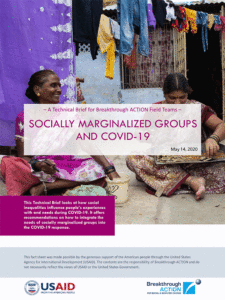Recognizing social inequalities during the immediate crisis response, during maintenance and recovery, and after the pandemic is the first step in safeguarding vulnerable populations. Social and behavior change practitioners must acknowledge that these inequalities are socially determined—the result of inequitable public policies, not the fault of marginalized groups. As communities reach different stages of the pandemic at different times, the COVID-19 risk communication and community engagement (RCCE) response must consider the unique experiences and needs of individuals living in poverty or with restricted access to resources to avoid exacerbating existing disparities. This technical brief focuses on recommendations for addressing the unequal impact of COVID-19 in the immediate response to the pandemic, but these considerations will also be necessary as societies shift to maintenance and recovery phases.
This website was originally developed by Breakthrough ACTION (USAID Cooperative Agreement #AID-OAA-A-17-00017) under the leadership of Johns Hopkins Center for Communication Programs. This website is now maintained by Johns Hopkins Center for Communication Programs and its contents are the sole responsibility of CCP. The contents of this website do not necessarily reflect the views of USAID, the United States Government, or Johns Hopkins University.
© Johns Hopkins University. All rights reserved.


